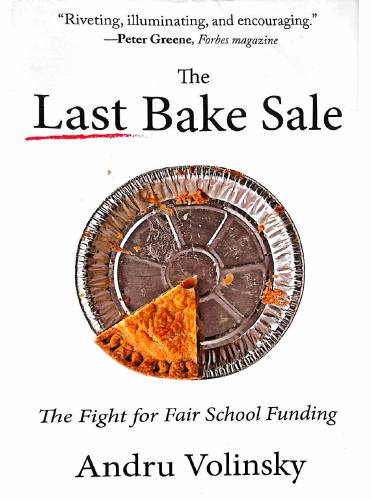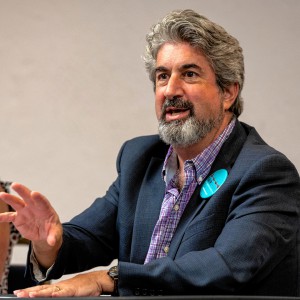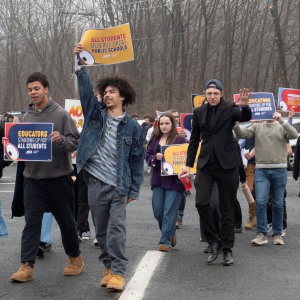Andru Volinsky takes aim at fellow Democrats in new book chronicling the school funding fight

Andru Volinsky's new book, The Last Bake Sale, is out April 1. —
| Published: 03-29-2025 6:58 PM |
In the locker room of the Concord YMCA some thirty-five years ago, a member of Andru Volinksy’s running group approached him with a proposition: How would he like to join a trial team being assembled to sue the state of New Hampshire?
Volinsky, a young and idealistic lawyer new to the Concord legal scene, had recently entered private practice after working death penalty cases in the South and as a public defender in Manchester. Battling at a resource deficit against the state was familiar territory but the topic at the heart of the case would be a new one.
After years of failed efforts by previous lawyers, the team wanted to convince a judge that the right to an adequate education was enshrined in the New Hampshire constitution. If they succeeded, the team believed, the state funding model for education – which relies mainly on local property taxes, to the detriment of communities with low property values – would change too.
For over three decades since that day in the Concord YMCA, Volinsky, 69, has served as one of the leaders in New Hampshire’s school funding movement. In his new book, “The Last Bake Sale”, published on April 1, Volinsky brings readers behind the scenes of a battle that remains very much in progress, documenting the legal and political strategies he’s weilded over the course of two trials, several Supreme Court decisions, and years of legislative inaction.
Volinsky, who went on to serve four years on the Executive Council and run unsuccessfully for Governor in 2020, offers sharp criticism for fellow Democrats, particularly U.S. Senator Jeanne Shaheen, who served as governor when the Supreme Court ruled the state’s school funding system was unconstitutional.
“Shaheen did not stand in any schoolhouse door blocking integration as the Southern governors did, but she and others were committed to undermining the Claremont II orders,” Volinsky writes, referring to the school district that served as the lead plaintiff in the court case.
Volinsky also calls out what he sees as “a failure of leadership” on school funding within the present state Democratic Party, directing particular criticism at Rep. David Luneau of Hopkinton, who has championed a school funding fix with which Volinsky disagrees.
Some of the debate surrounds the implementation of an income tax. Volinsky argues that one is necessary in order to fund education constitutionally, while Shaheen and Luneau proposed funding changes that they argued would not require one. Volinsky has pushed back that their proposed solutions would not satisfy the Supreme Court orders.
Article continues after...
Yesterday's Most Read Articles
Notified about the forthcoming book, both Shaheen and Luneau responded.
“During her six years as Governor, Shaheen led historic efforts to increase investments in New Hampshire’s schools, reform school funding in a bipartisan way and ultimately, improve outcomes for Granite State students,” Luisa Gunn, a spokesperson for the Senator, wrote in a statement.
“We’ve seen the results of [Volinsky’s] work not really manifest in fairer school funding and it really hasn’t moved the needle,” Luneau said in an interview.
The book, which is named after a bake sale the legal team organized at Concord High in 1994 to fundraise for its litigation, describes high legal drama and clandestine breakfast meetings between Volinsky and then-Attorney General Phil McLaughlin.
But it is the feud between the legal teams behind the two school funding cases currently before the Supreme Court that proves the book’s biggest present-day revelation.
In 2019, lawyers hired by the Contoocook Valley School District filed suit, arguing that the state was still failing to meet its duty to adequately fund education as defined in the Claremont cases brought by Volinsky and his team.
To his surprise, Volinsky said he first learned about the case in the pages of the Monitor.
“We would have been happy to provide insights learned from our long experience, but no one asked,” Volinsky wrote.
When he reached out to offer his expertise, Volinsky relayed that the lawyer, Michael Tierney, “had no need for our assistance, and that he had dropped claims thought critically important.”
In 2022, shut out from the ConVal case, Volinsky and his team filed another case of their own. A portion of that case along with the ConVal case are currently awaiting decisions by the Supreme Court, which are expected in the coming months.
As the two cases proceeded along parallel tracks, Volinsky writes that Tierney has rebuffed efforts to consolidate them and has requested that a judge quash subpoenas seeking testimony of ConVal witnesses. Though the two sides are ostensibly chasing similar goals, they are not on speaking terms, according to Volinsky.
Tierney wrote in a statement that “the decisions with which Attorney Volinsky takes umbrage were decisions made in our clients’ best interests. As attorneys, that is our role, and we are surprised to hear that Attorney Volinsky interpreted our role any differently than that.”
Volinsky said he wrote the book to serve as a guide for others who are embarking on the school funding fight.
“People in the future will continue to advocate and they need to know what has happened, what brought us to this point, and one of the aspects of that is a failure of leadership by the Democratic Party in New Hampshire,” he said in an interview.
Unlike many politicians, Volinsky pulls no punches, calling it like he sees it. But when asked whether he will ever run for elected office again, Volinsky smiled and gave a characteristic politician’s non-answer.
“I am focused on the book and the book is about leadership and leadership is what we need now,” he said.
Jeremy Margolis can be reached at jmargolis@cmonitor.com






 Dash to the dealership?: Local consumers, car sellers brace for auto tariffs to kick in Wednesday
Dash to the dealership?: Local consumers, car sellers brace for auto tariffs to kick in Wednesday MTA president offers ways for legislators to address ‘unprecedented dangers’ to K-12 education in state
MTA president offers ways for legislators to address ‘unprecedented dangers’ to K-12 education in state Nearly all of South Hadley High’s student body holds ‘walkout to walk-in’ rally to oppose cuts, call for funding reform
Nearly all of South Hadley High’s student body holds ‘walkout to walk-in’ rally to oppose cuts, call for funding reform ‘Wallace the Brave’ tumbles onto Gazette comics page
‘Wallace the Brave’ tumbles onto Gazette comics page
